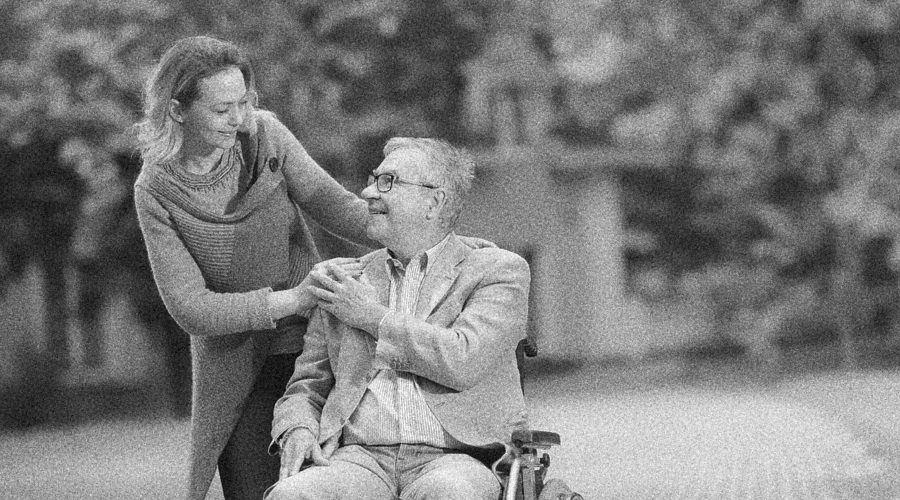A woman named Angela had a strained relationship with her elderly father, and when her mother died, she was unsure how much attention and support she owed to her surviving parent. He had always been gruff, stubborn, and judgmental, and even something of a bully to her and her brother—and now that he was increasingly frail and unable to care for himself, Angela was torn between sympathy and a sense that he was finally getting what he deserved. She had a full-time job and her own family to raise, but she had promised her mother she’d look after her dad—and so, with a considerable sense of resentment, she quit her job and became his primary caregiver. One night, when he was hospitalized yet again for another medical emergency, Angela stepped outside and, resisting the urge to scream aloud in frustration, instead prayed from her heart, saying, “Why are you doing this, God? This man is unhappy and has so little life, and he is making mine impossible. Why is he still here?”
Angela had prayed about her father many times before with no apparent answer, but this time she heard God speak in her heart, telling her, “You are hurt because you believe that he doesn’t love you—but he does. He is [still] here because you have something to learn.” For the first time in several years, Angela felt inner peace, and as she later wrote, “Three more years passed before my dad—who my children called Poppy—left this world. But in the remaining years I had learned to give him grace. I spent time with him, asking him about his youth, trying to understand his unfulfilled dreams and his love for my mother, my brother and myself. I came to appreciate his talent and passion for music and the honor that he felt serving in World War II. As I watched him succumb to the effects of Parkinson’s and dementia, I observed a poise in him that I had never noticed before. He accepted the end of his life with courage and dignity. With his favorite big band music playing, I spent the last visit with my dad, talking and singing to him. As I choked back tears I whispered to him, ‘I love you.’ No longer able to speak, he mouthed back to me, ‘I love you too.’”
Two weeks after her father’s funeral Angela was in the drive-through line of a fast-food restaurant, thinking about him and wondering if she had been a good daughter, when she noticed the license plate of the vehicle in line ahead of her—a personalized plate that read: L-U-V P-O-P-Y. As she later wrote, “Despite my [Christian] faith, I am a cynic—a ‘Doubting Thomas.’ But I couldn’t find any way to read that license plate except as ‘Love, Poppy.’ To this day, I have never seen that license plate again. I have accepted that seeing it was a gift from God and possibly my dad telling me that I did a good job [caring for him]. I like to think that perhaps the grace that I had finally given my father had been given back to me” (Amy Newmark, Miracles and the Unexplainable, from the series Chicken Soup for the Soul, pp. 91ff). As Angela discovered, God arranges our lives so that we can grow in grace and learn important lessons—and He blesses those who try to be good students.
God is very careful never to overwhelm us; He asks us to grow in wisdom and faith but usually allows us to do so at our own pace, rather than rushing us. Sometimes this process of growth involves the entire Church community; we see in the Acts of the Apostles (5:12-16) that the miracles performed by St. Peter and the other apostles resulted in a steady increase in the number of believers. Quite often, however, growth in wisdom and truth also occurs on a personal basis, as with John, the author of the Book of Revelation (1:9-11, 12-13, 17-19); obeying the Lord’s command to write down the visions given to him not only benefited the entire Church but also helped him grow in faith himself. This was especially true for the apostle Thomas (John 20:19-31), who initially doubted the Lord’s Resurrection, despite the testimony of his comrades. Jesus appeared to him, calling him to let go of his doubts and fears, and instead believe in His Easter victory over death. Thomas learned this lesson so well that he addressed Jesus as “My Lord and my God!”—the only time in the Gospel of St. John that anyone directly referred to Jesus as being divine.
With every passing year, each of us should become a bit wiser, holier, and closer to God; however, because of our human weakness, sinfulness, and sometimes stubbornness, this process isn’t always as seamless, easy, or direct as we might desire. Just as the Lord told Angela that her father was still alive so that she might learn compassion, so it’s possible God has a specific lesson in store for us—a truth we must learn or accept, or a lesson we must practice or master, before we can move forward on our spiritual journey. If we’re restless or anxious or upset but unable to figure out why, that’s quite often a sign that we need to address an unresolved issue from earlier in life, or give a higher priority to our relationship with God; if so, we need to pray in all sincerity, “Lord, what are You trying to tell me? What are You asking me to do?” If we’re very satisfied with ourselves, happy with our life and our accomplishments, and prone to feel proud or smug or judgmental toward others, we need to learn a lesson in humility—and God may bring this to our attention by allowing us to experience failure and embarrassment. If we’re nursing a grudge or refusing to forgive someone who hurt or wronged us, we certainly need to learn the importance of mercy, asking the Lord to help us forgive even those we feel are undeserving of forgiveness, while coming to learn that we forgive not for the other person’s benefit, but for our own.
If we’re prone to any of the seven deadly sins, the Lord wants to help us learn how to resist and overcome them: for instance, becoming more aware of how to control our temper, freely embracing fasting and sacrifice instead of giving into gluttony or self-indulgence, asking God to give us a metaphorical kick in the rear to shake us out of our laziness, helping us conquer our envy by reminding us of all the blessings we’re received, offering us the special graces needed to avoid temptations and occasions of sin in regard to lust, and so on. Above all, the Lord wants to help us grow in faith so as to overcome our fears and worries and doubts—not necessarily appearing to us in person, as He did for Thomas, or speaking directly to us in our hearts, as He did for Angela, but by gently making us profoundly aware of His loving presence and giving us a glimpse of His glory and His fatherly care for us. Reading Scripture, talking to a wise and trusted friend, watching a religious movie, regularly examining our consciences, and spending quiet time with the Lord each day, are all valuable ways of growing in wisdom and grace. Lessons about God, ourselves, and life in general, aren’t always easy or fun, but they are helpful, beneficial, and truly necessary for our spiritual growth and eternal happiness. Jesus said, “Blessed are those who have not seen and have believed.” We might also imagine the Lord Jesus saying, “Blessed are those who open their hearts to My truth—for they shall receive the fullness of freedom and peace and life.”






























